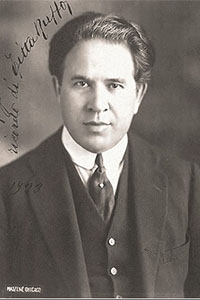The History of Titta Ruffo

Born: June 9, 1877
Died: July 5, 1953
Italian Tenor.
He was self-taught, and his voice was a wreck before he was 50. When asked once, why he had never taught, he candidly replied that he’d never learned to sing properly, so how could he teach it to others. But what a natural talent and what a voice.
Fasten your safety belts for his Credo from Othello.
Credo / Othello / 1914 – Titta Ruffo

The History as it was Recorded
Sydney Rhys Barker
